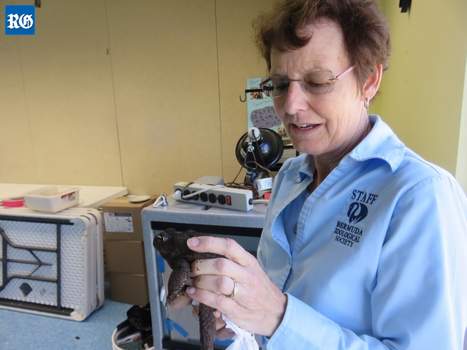Recent News
Press Release: Lionfish projectTuesday, March 13, 2018
It is often said that good things come in groups of three, and that might be the case for a trio of research projects aimed at reducing a threat to Bermuda’s marine biodiversity: the invasive lionfish.
Video: Sharks Feed On 30 Foot Dead Whale
Thursday, March 01, 2018
Calling it a “once in a lifetime encounter,” Weldon Wade posted video footage showing sharks feeding on dead 30-35 foot sperm whale floating off Bermuda, with the video also showing Marine Biologist Choy Aming on top of the whale capturing GoPro footage from a very unique perspective.
Bridget the turtle prepares for return to sea
Friday, February 09, 2018
When Aerial Williams went fishing, a turtle was the last thing she expected to find at the end of her line.
Video & Photos: Turtle Successfully Rehabilitated
Thursday, February 08, 2018
A sea turtle that was accidentally caught by a young girl has been successfully rehabilitated following surgery to remove a fishing hook, with a group gathering today [Feb 8] at the Bermuda Aquarium and Zoo [BAMZ] to make the announcement, while also educating the public on how injured sea turtles should be handled.
BZS Set To Host “A Home For A Bluebird”
Sunday, February 04, 2018
The Bermuda Zoological Society [BZS] is getting set to host an event titled “A Home For A Bluebird” on Sunday, March 4, with the first presentation to take place from 10.00am to 11.30am and the second presentation to take place from 1.30pm to 3.00pm.
About
GovernanceAbout Us
Newsletter
Latest News
Gift & Bookstore
Contact
General Inquiries
info@bzs.bm
Latest News
All the latest updates and news from the Bermuda Aquarium, Museum, and Zoo, one of Bermuda's leading visitor attractions!
Jonathan Bell
Published May 10, 2018 at 8:00 am (Updated May 10, 2018 at 6:53 am)

Combination of factors: Jamie Bacon, a researcher and educator for the
Bermuda Zoological Society, looks after a toad exhibiting
deformities from pollution (Photograph by Jonathan Bell)
Bermuda’s “safest form of pest control” is under threat from water pollution, a researcher who has tracked the island’s cane toad population for about 20 years warned yesterday.
Jamie Bacon, the principal investigator for the Bermuda Amphibian Project, run by the Bermuda Zoological Society, said a fall in the toad population meant a boom for nuisances such as centipedes. Dr Bacon added: “I wouldn’t be surprised if centipedes are able to move into areas where they haven’t been before.”
She said cane toads were rare in the East End of the island, so centipedes thrived as a result.
Dr Bacon added the insects often invaded homes and can deliver a painful sting.
Dr Bacon said she had heard centipedes had appeared in new locations such as Somerset and Spanish Point, although there was no data to show the extent of their spread.
Dr Bacon, an education officer at the Bermuda Aquarium, Museum and Zoo, has spent 20 years tracking cane toad deformities caused by hydrocarbon pollution.
The BZS’s wetland research has found a variety of other contaminants — including toiletries and antibiotics that have worked their way into island ponds after being flushed down toilets.
Dr Bacon said: “It shows you that what comes out of our cesspits does not go straight down, but can move laterally in the water table.”
A combination of factors have hit the island’s cane toads, a major consumer of insects like cockroaches, which were introduced to the island in the 19th century.
The amphibians secrete poison that makes their eggs and tadpoles toxic to most predators.
But the young toads that make their way on to land are prey for birds, particularly another introduced species, the yellow-crowned night heron.
Dr Bacon said: “We’ve also lost a lot of cane toad breeding sites, so that when the cane toads in your yard die off, there are often no places nearby where toads migrate from to replace them.”
Dr Bacon added: “We don’t know yet what effects the toiletries might be causing, but we feel they aren’t having nearly the effect that we see with the hydrocarbons and metals which are at much higher concentrations.”
Cane toads, the world’s largest species, originated in South America but have been introduced worldwide to eat agricultural pests — and have become pests themselves.
Bermuda’s cane toads began to show deformities in 1998 traced to hydrocarbon pollution, which also interfered with their ability to reproduce.
The zoological society has run a wetlands remediation programme that won support from HSBC in 2014, and has cleaned up Cloverdale Pond in Smith’s and Evans Pond in Southampton. Dr Bacon warned: “This is what we’re seeing in wildlife — keep your eye on anything like this happening to people.”
Tadpoles can be collected at this time of year from toad breeding sites and raised for release into gardens, as long as there are wet places for them to take cover during the day.
Dr Bacon said medicines can be burnt or disposed of at pharmacies instead of flushing them down toilets. She added: “You can also use the least toxic pesticides that you can.”


